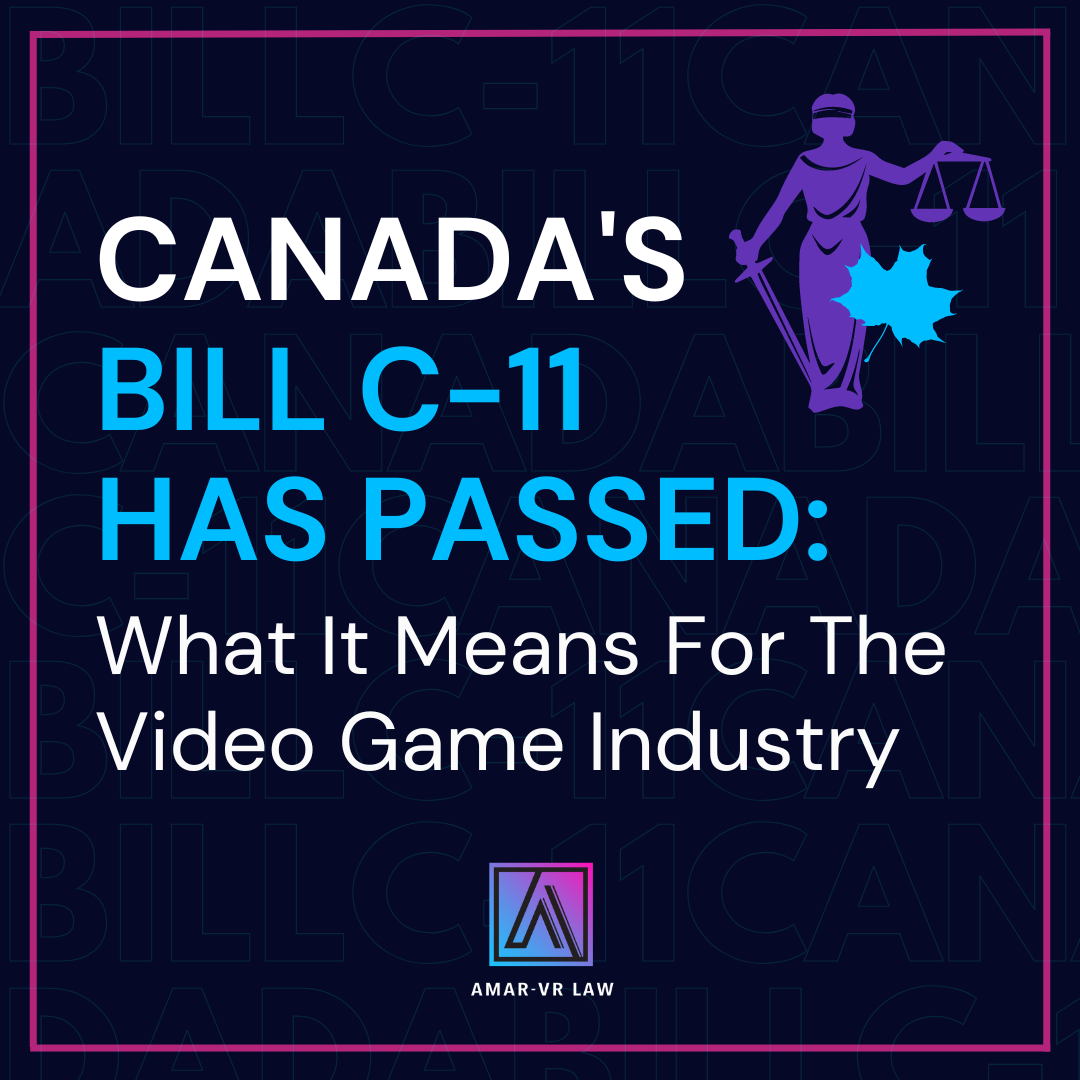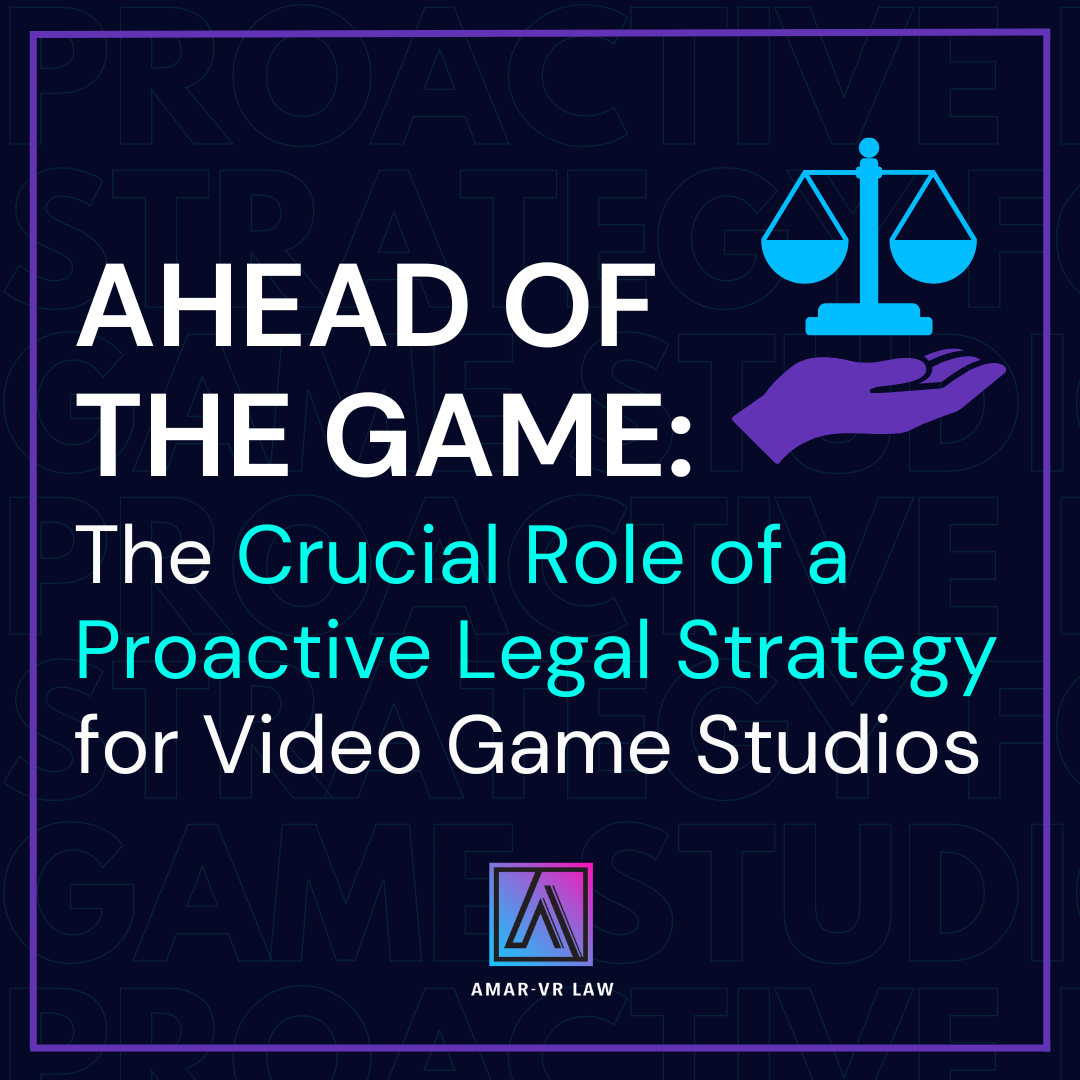
This article is for educational purposes only. Nothing in this article shall constitute legal or other professional advice or an opinion of any kind. Please contact Amar-VR Law, or your own legal counsel, if you have any questions regarding a specific legal issue.
It's official: Canada's Bill C-11 has passed.
This contentious new legislation is causing concern in the gaming community, with potential consequences for the industry as a whole. From developers and studios to streamers and players, everyone will notice the effects of Bill C-11, which aims to regulate online streaming and broadcasting. Read along as we outline this new law, unravel the controversy behind it, and explore how this bill could reshape the Canadian gaming landscape.
Get ready, because the game may be about to change!
What is Canada's Bill C-11?
It’s important to understand the purpose of Bill C-11, and why it was tabled in the first place, to fully comprehend the impact it might have on Canadian game developers and streamers. The issue is somewhat of a complex one, so we’ll break it down from the beginning.
Canada’s Bill C-11, also known as the
Online Streaming Act, is an act that amends Canada’s existing
Broadcasting Act, which outlines how the Canadian broadcasting system is controlled and regulated. The Broadcasting Act also sets forth requirements that broadcasters must adhere to in terms of airing “Canadian content”, or “CanCon”, as well as the
criteria that content must meet to be deemed “CanCon”.
Still following along?
The Broadcasting Act, which was originally passed in 1936 and updated in 1991, was designed to cover the major broadcasting channels used at the time, namely television and radio. The use of the internet was not yet ingrained in our daily lives the way it is now, and as such, the Broadcasting Act did not include provisions for the popular online broadcasting channels we use today.
For this reason, the Online Streaming Act was born, aiming to update the Broadcasting Act to meet the viewing and listening habits of today’s digital consumers. Online streaming services, such as Netflix, Spotify, and YouTube, are now subject to the Online Streaming Act, and will be required to follow new regulations that weren’t previously in place.
So, what are the new rules?
Online streaming platforms, much like traditional TV and radio broadcasters, will be required to promote a certain amount of “CanCon” to Canadians on their platforms, and will need to reinvest in Canadian productions to keep the industry thriving. Users can choose to watch or disregard the promoted “CanCon”, but it will be displayed more prominently to encourage users to consume Candian content more often.
Most of this sounds like a win for Canadian creators, so what’s the issue?
Why Are Video Game Industry Leaders Speaking Out About Bill C-11?

It’s clear why digital media giants like Netflix and Disney+ would be averse to changing the way they operate in Canada, but the reason for fear and distrust among Video Game industry leaders is less obvious.
Much of the controversy surrounding Bill C-11 is due to confusion around the applicability and enforcement of the law. While the Canadian government claims that
Video Games themselves will not be regulated, and nor will user-generated content (UGC), some in the industry have doubts.
Guidelines that the Canadian Radio-Television and Telecommunications Commission (CRTC) will use to determine applicability seem to contradict the claim that all UGC on social media will be exempt from regulation, specifically when the creator earns revenue or has a large following of subscribers.
A proposed amendment to the bill would have explicitly protected digital-first creators (i.e. streamers and podcasters) and UGC from regulations under the Online Streaming Act,
but was struck down on March 7th, 2023. This rejection, coupled with the initial distrust around the new law, has only added to the confusion and worries regarding the Act.
Overall, many key players in the Video Game industry are voicing their concern over Bill C-11, and the need for clarity as quickly as possible.
How Could Bill C-11 Affect Video Game Developers, Streamers, and Players?

Though the Online Streaming Act is not designed to affect the Video Game industry directly, the indirect consequences of streaming regulations could be monumental. Here is a brief look at how different industry stakeholders may be affected by the new law:
- Developers and Studios:
The Canadian Government has stated that Video Games do not fall under their description of broadcasting content, and as such, the government has no plan to regulate online Video Games under the Online Streaming Act. That being said, the vague nature of the Act has some studios worried that their typical marketing procedures, namely those involving popular streamers or sharing in-game content on platforms like Twitch and YouTube, will be threatened. The Canadian government continues to assure individual creators that it’s the publishers that will be regulated, not the creators themselves, so hopefully these fears will be quelled as more information becomes available.
- Streamers: Video Game streamers are in a unique situation with the passing of Bill C-11. The reason for that lies in the nature of their work, which takes place almost exclusively on digital streaming platforms. The Canadian government states that individual streamers and podcasters will not be regulated, only the platforms they choose to publish their work on. Assuming that remains the case, the Online Streaming Act will mean that their content may be promoted more or less (depending on if they meet the “CanCon” criteria or not) to Canadian users, which could have a significant impact on their streaming revenues.
- Everyday Gamers: From the gamer’s perspective, the Online Streaming Act may affect the amount of online content they see about their favourite games, or the industry in general. You may notice more Canadian content showing up in your recommendations on platforms such as Youtube and Twitch, though Video Game streaming platforms themselves should remain exempt.
Though more discussion still needs to happen, it’s clear that the
Online Streaming Act will have an impact on the Video Game industry. As more information becomes available, stakeholders will need to stay up to date and adapt to potential changes as precedents are set.
Conclusion
The Online Streaming Act brings controversy for a reason; there’s too much confusion surrounding the new law. With a lack of trust and clarity surrounding the issue, players in the Video Game industry are understandably concerned about what the Act may hold for the future of their businesses.
If the
Online Streaming Act is causing stress for your team, a Video Game Lawyer can help you better understand the intricacies of the new law, and operate safely within it.
Contact Amar-VR Law
to discuss your specific situation, and ensure that your online streaming content won’t be negatively affected by Bill C-11.
Together, we can navigate the changing landscape of Canadian gaming regulations.





Address:
100 King Street West,
Suite 5700
Toronto, ON
M5X 1C7
Email: hello@amarvrlaw.com
Phone: 289-919-5929
Business Hours:
Monday: 10:00 AM – 6:00 PM
Tuesday to Friday: 9:00 AM – 5:00 PM
Saturday 9:00 AM – 12:00 PM
Address:
100 King Street West,
Suite 5700
Toronto, ON
M5X 1C7
Email: hello@amarvrlaw.com
Phone: 289-919-5929
Business Hours:
Monday: 10:00 AM – 6:00 PM
Tuesday to Friday: 9:00 AM – 5:00 PM









